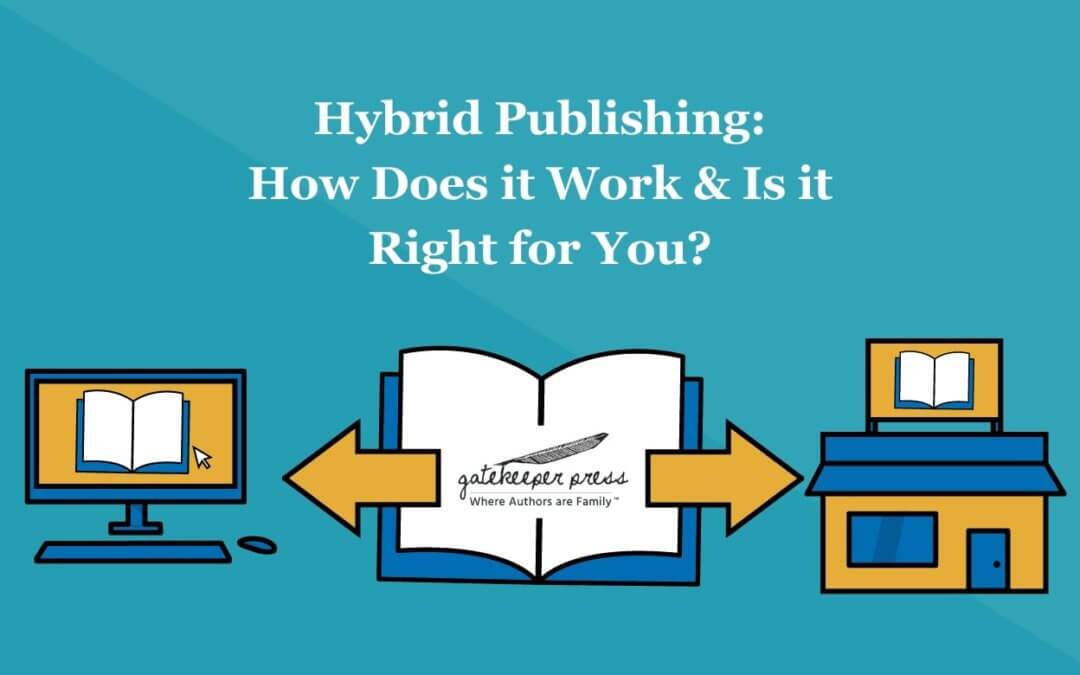When we hear the word “hybrid” most of us know that it pertains to the blending of two or more elements. Think of how a hybrid vehicle utilizes a blend of gas and electric power, for example. When we talk of hybrid publishing, it represents the fusing of both the traditional publishing model with the self-publishing model.
It is important to make a distinction between hybrid publishers and vanity publishers. The two are similar in that they both require authors to pay for the costs related to producing the book. However, hybrid publishers operate much like traditional publishers in that they, too, have editorial, design, and marketing professionals on board.
Hybrid publishers abide by a set of criteria that define their standards for selecting and representing book projects. A vanity press, on the other hand, does not operate by this same code of ethics and is not selective in the book projects they produce.
Continue reading to learn more about hybrid publishing.
What Is Hybrid Publishing?
Let’s unpack how hybrid publishing differs from traditional publishing.
A traditional publisher does not require any upfront payment or subsidization of the book from the author. In fact, the author is typically paid an advance in exchange for the rights to the manuscript. The traditional publisher is tasked with editing, designing, and distributing the book.
Authors begin receiving subsequent royalties once they have broken even, meaning their sales royalties have equaled the advance. From that point on, the author receives a royalty of about 10% for each print book sold.
The hybrid publisher collects anywhere from $3,000 to $5,000 from the author at the outset, which covers the costs involved in publishing the book. They provide editing and design services and are responsible for the distribution of the book. Some hybrid publishers may also offer marketing services. Royalties paid are about 25% for each print book sold.
How Does Hybrid Publishing Work?
Hybrid publishing can work in various ways. Consider these different types of hybrid publishing:
Partnership hybrid model. This is the most common variety of hybrid publishing. The author pays the publishing costs upfront and the publisher takes care of the editing and distribution of the book.
Agent-assisted hybrid model. Some literary agents may receive an author submission and feel strongly that it has commercial appeal, but not to the level that most traditional publishers require. The agent may cut a deal with the author and take care of the production of the book themselves.
Crowdfunding hybrid model. Some authors may rely on crowdfunding efforts to attract enough money to cover the publishing costs required by the hybrid publisher. Sometimes the publisher will begin working on the book before the total amount has been raised.
Now that you know how hybrid publishing works, you’re probably wondering “Is it worth it?” Read on to find out the pros and cons of hybrid publishing.
Pros of Hybrid Publishing
Let’s consider the benefits of hybrid publishing:
- You earn a higher royalty. Hybrid publishers pay double to triple the royalties of traditional publishing houses.
- They handle the details. While both hybrid publishers and traditional publishers handle the editing, design, distribution, and marketing of your book, self-published authors will have to hire contractors or editing services or do the work themselves.
- You do have some say. Authors going with a hybrid publisher will be able to weigh in on various design decisions, where a traditional publisher controls all aspects of the book. However, a self-published author retains full control over all design decisions pertaining to their book.
- You retain the rights. Signing a contract with a traditional publisher means giving up the rights to your book. They basically own the book. A hybrid publisher, like self-publishing, allows you to maintain ownership of your book in all forms.
Cons of Hybrid Publishing
Let’s take a look at the downsides of hybrid publishing:
- Beware the vanity press. Because of their similarities, some unsuspecting authors may end up plunking down thousands of dollars, thinking it is a legit hybrid publisher when it is actually a vanity press.
- Upfront costs. The hybrid publishing option involves a certain amount of financial risk. Traditional publishers, on the other hand, are likely to provide an advance when they sign the author. The self-published author pays for essential services like cover design or editing as they go.
- Promotion and marketing are not guaranteed. A traditional publisher puts at least some marketing heft behind the promotion of your book, where the hybrid publisher may or may not. Like the self-published author, a hybrid publisher may require the author to do the heavy lifting when it comes to marketing your book.
Self-Publish Your Book With Gatekeeper Press
When using a hybrid publishing service, you will assume some risk. Your financial outlay could be several thousand dollars, with no guarantee that you will sell enough books to even recoup the costs, much less land in the green.
Instead, why not take the self-publishing route? You will earn higher royalties while retaining 100% control over all your works. Better yet, partner with Gatekeeper Press for all your editing, design, and distribution needs. Schedule a free consultation today!


